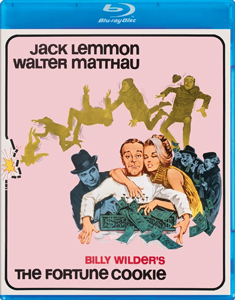The more movies I watch, the more rules of thumb emerge. One is that comedies are best at 90 minutes. Another, as I realized while watching “The Fortune Cookie” (1966), is that movies where the characters’ worldviews end at the same point they began, should be about 90 minutes.
Proving that even Billy Wilder and I.A.L. Diamond fumble the ball sometimes, “The Fortune Cookie” is a 125-minute movie where we generally know what’s going to happen the whole time. Jack Lemmon plays the Good Person, CBS cameraman Harry, who is accidentally run over and concussed on the sidelines by Cleveland Browns player Boom Boom Jackson (Ron Rich).
Walter Matthau plays the Bad Person, lawyer “Whiplash” Willie – Harry’s brother-in-law – who sees the accident as an opportunity to get a big payday from the Browns, CBS and Municipal Stadium. No one changes over the course of the film; instead, we wait for decent man Harry to shrug off slick Willie’s scheme and stop pretending to be injured.

“The Fortune Cookie” (1966)
Director: Billy Wilder
Writers: Billy Wilder, I.A.L. Diamond
Stars: Jack Lemmon, Walter Matthau, Ron Rich
To be fair, “The Fortune Cookie” is not flawed in its construction (it’s merely too slow and long), nor is Lemmon’s performance off-point. Harry is not in it for the money; he’s in it for love. He hasn’t gotten over his ex-wife Sandy (Judi West), and she will take care of him if he continues to fake his need for a wheelchair, corset and neck brace.
The air comes out of the ball
Wilder and Diamond write many witty lines, but the film is short on satirical bite. The few times the satire does land, we recognize how it’s missing from the movie overall. In a funny and harsh lesson about how dishonesty is pretty easy if the receiver doesn’t have all his senses on alert, Judi sweet-talks Harry on the phone. We as viewers see her end of the conversation, though: In the background is her new lover, in her bed.
The lawyer stuff strikes me not as satirical, but instead completely realistic. If Willie, whose whole career is built on ambulance chasing, can get over the initial hurdle of Harry successfully pretending he’s injured in front of a panel of doctors, then he’s almost on easy street. He can name a huge sum, and the lawyers for the bigwigs will pay a fraction of it (still a large amount) so this PR nightmare will go away. Wilder and Diamond handle the details of Willie’s scheme so well that it’s never satirical.
Another aspect I support in the abstract but not in execution is the “friendship between races” theme that might’ve had more impact in 1966, but even then many might’ve found it saccharine. Harry sees that his scheme is hurting Boom Boom’s concentration on the field – Art Modell (yes, the movie uses the real owner’s name) even suspends him – and when someone is racist toward his friend, Harry won’t stand for it. (Or rather, he will stand for it, but by standing up from his wheelchair, he’ll blow the scheme.)

The overall experience of “The Fortune Cookie” is flat, because nothing is surprising, and it even over-explains itself. For instance, Willie discovers opposing council’s recording devices in Harry’s apartment. A more confident movie would indicate without words that he’s now going to say things that he wants his opponents to hear. But he takes Harry into another room to explain that he’s going to do this. Compared to elite Wilder films such as “The Apartment,” this one does not trust its audience.
“The Fortune Cookie’s” message is that what you see isn’t always the reality. But in the movie itself, what you see is what you get: Everyone is who you think they are, and the plot will play out like you think it will. Over 90 funny minutes, that could be a wonderful time. Over 125 minutes that offer occasional smiles but no belly laughs, it’s a grind.
Wilder Wednesdays looks at the catalog of legendary writer-director Billy Wilder.

